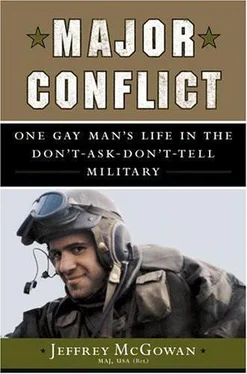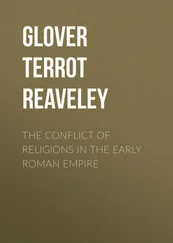He lurched forward on the edge of the couch and poked the cigar at me.
“Fair? We are not working in a democracy, Captain. There is no fair here. I do not even want to consider the possibility that you don’t understand your responsibilities here. Now… in fairness, I am going to ask you this one last time, is there anything I need to know?”
I dropped my head. I needed to think this out clearly. It was now not only Sergeant Lopez’s career on the line but my own as well. Finally, I looked at him and said, firmly, “Sir, I understand your view. But with all due respect, I have to say I am extremely uncomfortable with what it is you’re asking me to do.”
An eerie calm came over him. He sat back into the couch and relit his cigar. I knew this wasn’t a good sign. It was worse than yelling, this silence, because I knew he’d moved to the next level. The colonel was a brilliant tactician. He didn’t get to wear those oak leaves for nothing. If he wanted, he could have me demoted to base cesspool cleaner for the duration of my career.
There was no getting around it now. Lopez was fucked, and I was fucked for trying to save him.
“Jeff, where do you see yourself going from here?” he said, refusing to look at me, looking down the ash of the cigar instead. “Increased responsibility requires a broad understanding of army values and an ability to protect the institution.” He stood up slowly.
I started to rise, but he pushed the palm of his hand at me. “Remain seated,” he said, and walked briskly out of my office.
I just stood there, staring at the closed door, feeling numb at first, then frightened, then very, very angry, and then finally just terribly sad. Most of all I was disappointed in Colonel Fazio. We had talked at great length about his pride in the army’s diversity. We had talked about his children at barbecues. He was a terrific husband and father, and not only did I enjoy his company, I liked his family as well.
The truth was I was taking this very personally. It felt as if all the things he’d said about Lopez were aimed at me, too, and that hurt like hell.
Now, I had been on the wrong end of his anger before. And I’d learned that if it turned out he was wrong he’d usually come around and try to make good. This time, though, I didn’t care whether or not he came around.
Don’t get me wrong. I was as much a careerist in the army as he was. And I knew he could squeeze me out as easily as he intended to squeeze out Sergeant Lopez. What bothered me the most wasn’t his hatred (or fear, or both, depending on your point of view) of homosexuals. He was a product of his environment, after all. He’d been in the army his entire adult life, and the army provides little incentive (you could probably argue it provides disincentives) to develop your own thoughts on the issue of gays in the military. Why distinguish yourself from everyone else? What would he have to gain? I can’t pretend that I was shocked by his intolerance.
No, what bothered me more than anything was just how personally he’d taken the whole thing, as if Lopez’s mere existence (and mine, by extension) in his unit was a personal affront to his character and command. In fact, it had nothing at all to do with him personally. But, of course, he couldn’t see that, at least not right away. I spent the next few days expecting a phone call informing me that I was being relieved of my command, but the call never came. When the weekend finally arrived, I tried to relax and put the whole thing out of my mind. On Friday night there was a “hail and farewell,” a function we had regularly to welcome new officers to the base and say good-bye to those who were leaving. I sat gloomily at the bar, convinced that any “greeting” on my part would be a waste of time since my days were numbered. Just when I thought I’d head home, I was approached by one of the most beautiful women I’ve ever known. It was Maggie Fazio, the colonel’s wife. She was from Mississippi, a real southern belle. Her father was a retired lieutenant general who’d served stateside for most of his career. Maggie was one of those women who are so stunning and self-possessed that a room changes when they enter it. She had class, and a tremendous sense of self-worth and character. And also a wicked sense of humor. She was a tall woman, with long blond hair, a long, perfect nose, and full lips. We got on together like a house on fire. She was clever and funny and beautiful, and she had impeccable timing. She smiled as she sat next to me at the bar.
“You on the lam from the New York authorities, old boy?”
I smiled. “Apparently I’m wanted in all fifty, I’m told.”
“Don’t be so hard on yourself, Jeff… . Things have a way of coming round.” Her presence was always like a gift. I breathed easy for the first time in days. Maybe the death blow was not so close after all. “Has he told you anything, Maggie?”
“Oh, hells bells, Jeff, you know how he is. When someone is twisting them on him, all he does is talk about them but not really about the issue at hand. You, of course, have been the topic of conversation for a number of dinners and breakfasts. I have never seen the man quite so angry; now why not tell me your side of the story?”
I told Maggie Fazio the whole story. She was an intense listener, periodically nodding her head, putting me at ease with an occasional “uh-huh” or “ah” or “I see.” It felt good to get it all out and to have such a sympathetic ear. I ended up with this:
“To go after this man was no different than going after someone because they’re black or a woman. I believe in fairness. Soldiers have to know that if they follow the rules they will be treated fairly. Lopez did nothing wrong. It was a witch hunt at best, and as much as I like your husband—you know how much I like the colonel, right? [Maggie Fazio nodded her head]—I just couldn’t let myself be a part of it. Whether he was gay or not never really entered into the grand scope of things. If he was, the policy states that we shouldn’t ask, so technically he deserved a reprieve. But they still want him out—by any means available. It just isn’t right.”
I finished off my third whiskey and was about to say good-bye to her when she tilted her head at me and smiled.
“He is a handful, Jeff, isn’t he?” she asked, rolling her eyes and laughing softly. “You can’t blame him for doing something he thought was right by the old guard, yes?”
I nodded. And I couldn’t blame him, really.
“But, Jeff, I get it. I get it,” she repeated, patting my hand, “and I know for a fact that eventually he’ll get it, too.”
With that she stood up, gently kissed my cheek, and disappeared into the crowd, leaving behind a trail of Opium perfume. I didn’t know what to feel now. Maybe she was right. Maybe the colonel would come around. But even if he did, it wouldn’t be soon enough to save me. I was doomed. I hunkered down and ordered another whiskey.
That Monday I went into the office earlier than usual. I’d planned actually to start going through my desk, so convinced I was that Colonel Fazio was going to give me the ax. When I walked into the room, the first thing I noticed was an envelope lying on the floor, a few feet from the door, as if someone had slipped it underneath. I opened it. Inside was a card with a picture of a gorilla on it. The card read, “It takes a big man to know he was wrong.” Below that, in the undeniably strong handwriting I’d come to recognize instantly, was the signature, Colonel Joseph Fazio.
Sergeant Lopez survived without any adverse action taken against him, but when it came time to reenlist he refused to consider the possibility. He could read the writing on the wall: there was no future for him in the military.
Читать дальше












